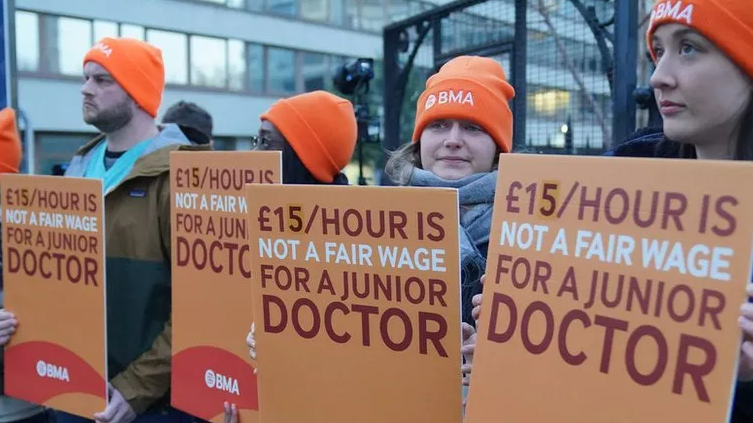'We are here for you', says doctor as strikes begin

Doctors are striking across the country
- Published
A North East doctor reassured the public as the 10th round of junior doctor strikes began on Saturday morning.
The five-day national walkout got under way at 07:00 GMT, with NHS bosses warning it will cause major disruption.
Dr Sean Fenwick, from the Sunderland and South Tyneside NHS Foundation Trust, said the NHS would still be there for those who needed it most.
He said: "We are here if you need us, we are fully staffed and able to care for those with acute and life-threatening illnesses."
Pay dispute
The industrial action is the latest strike in a long-running pay dispute between England's junior doctors and the government.
The British Medical Association (BMA) has asked for a 35% pay rise, but ministers say the claim is unreasonable.
Health Secretary Victoria Atkins has urged the BMA to call off the strikes, saying: "No-one should underestimate the impact these strikes have on our NHS."
BMA junior doctor leaders Dr Robert Laurenson and Dr Vivek Trivedi said the government could have stopped the strikes by "simply making a credible pay offer to begin reversing pay cuts they have inflicted for more than a decade".
Closure
Strikes in the North East have caused disruption including the temporary closure of a minor injuries unit in Northumberland.
Alnwick Infirmary's unit will be closed until at least 07:45 GMT on Sunday to allow staff to help treat patients with more urgent needs.
Dr Jeremy Rushmer, executive medical director at Northumbria Healthcare, said: “This decision is a last resort, but is necessary to make sure that we can provide safe care to our sickest patients over the weekend, during the next period of industrial action.
“We apologise for any inconvenience that this may cause some patients and ask everyone to please think very carefully about where they access care."
Dr Fenwick echoed the sentiments, urging people with non-severe illnesses to avoid A&E and to contact 101.
He said: "There is a danger during industrial action that those with less severe illnesses will wait extended periods and we wouldn't want that for members of the public."